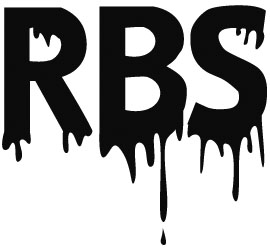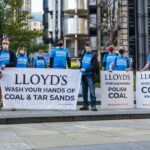Why I superglued myself to the Royal Bank of Scotland

Scotland is a country deeply associated with standing up for the underdog and challenging injustice. This is reflected in steps to become a Fairtrade nation, to build closer links with Malawi, to invest in renewable energy and to cut C02 by 42 percent by 2020. When I lived in Edinburgh, I worked alongside Scots to make these projects a reality.
Yet all of this ongoing work stands to be undone by a bank that carries Scotland’s name in its title – the Royal Bank of Scotland.
The Royal Bank of Scotland finances Tar Sands extraction – the most destructive fossil fuels project in the world. Alberta, Canada, may seem far from Scotland’s shores, but it is there that RBS money is enabling forests to be razed, rivers to be polluted and local communities to be suppressed. The refining process is at least 3 times as energy intensive as that for conventional oil. And all this at a time when the planet stands at the brink of climate catastrophe, in need of a great transition that will necessarily mean leaving the oil in the ground. Environmental damage won’t only affect Canada. Nor will it only affect people in poor countries – 300, 000 of whom already die each year due to climate change. It will affect all of us.
What is more, the Royal Bank of Scotland is doing this with money that belongs to us, UK tax payers. After the bailout, the public owns 84 percent of RBS. It is time that we had a say in how they spend our money.
Sadly the government does not agree. When a consortium of NGOs including the World Development Movement, Platform, and People and Planet took the Treasury to court last year, a High Court Judge blocked judicial review, effectively saying that the Treasury can legally ignore climate change and human rights in RBS’ investments.
It was because of these considerations that just over a week ago, I, and two friends, super-glued ourselves to the door of a Royal Bank of Scotland branch, so that we could speak to every customer coming in and out of the bank about what their money, and our money, was being spent on. Pinned to my front was a sign reading ‘You would be horrified if you knew where RBS invests your money’. The action was part of a day of action called by the Climate Camp, situated opposite RBS’ global headquarters at Gogarburn.
The responses were varied. Some people were supportive for environmental reasons, some were angry at RBS because of their role in the financial crisis, some joked about this being like a Fringe performance or a variation on the Dashing White Sergeant. Others simply wanted to use the bank. Our tone was always polite and friendly. After some time the bank decided to close, presumably not wishing their customers to be fully informed of the bank’s destructive practices. Sometime later we were arrested for breach of the peace – a charge that includes causing alarm. If customers were indeed alarmed at the Royal Bank of Scotland’s use of their money then it is the bank that should stand trial rather than those of us attempting to inform the world of their practices.
30 hours later, once released from police custody and reading through the newspapers, it was me who was alarmed. Police PR officers, politicians and leader writers appeared to have rounded on the camp.
Particular focus in media reports was given to a police press release alleging that activists spilt ‘an oil like substance on a main road’, even though, as the Climate Camp media team pointed out, ‘there were no pictures of the spill; no traffic reports showing disruption; no bystanders or drivers complaining; no banner and no word from any climate activist on any website saying they did it’. A complaint has been lodged with the PCC. Unfortunately this nevertheless became the tar with which the entire camp was brushed.
Protesters were being accused of being mindless, irresponsible vandals rather than the deep thinking people seeking to prevent the havoc of climate change I know them to be. The charge of irresponsibility particularly grated. Isn’t the willingness to risk one’s liberty to protect the planet, the very definition of a responsible citizen?
Many of those who camped opposite the Gogarburn headquarters of the RBS were Scots. Many were not. Every UK citizen has a stake in the Royal Bank of Scotland. We are all being hurt by the cuts born of the economic crisis. And we all stand to be affected by climate change. That means it is up to all of us to stand up to RBS, when its practices go against the very values for which Scotland is admired.
- Tim Gee is part of the Climate Camp. This article first appeared in The Scotsman on August 31st.


What you did was brave but simplistic. You need to suggest an alternative that people can live with. I don’t like this is too easy.
Cheers for the photos Tim, I’ve embedded one now.
Full video of the action is available here http://www.youtube.com/watch?v=EmaE5WxEtM4 and photos here – http://photo.climatecamp.org.uk/rbscamp/nine/index.html feel free to embed either
good work!